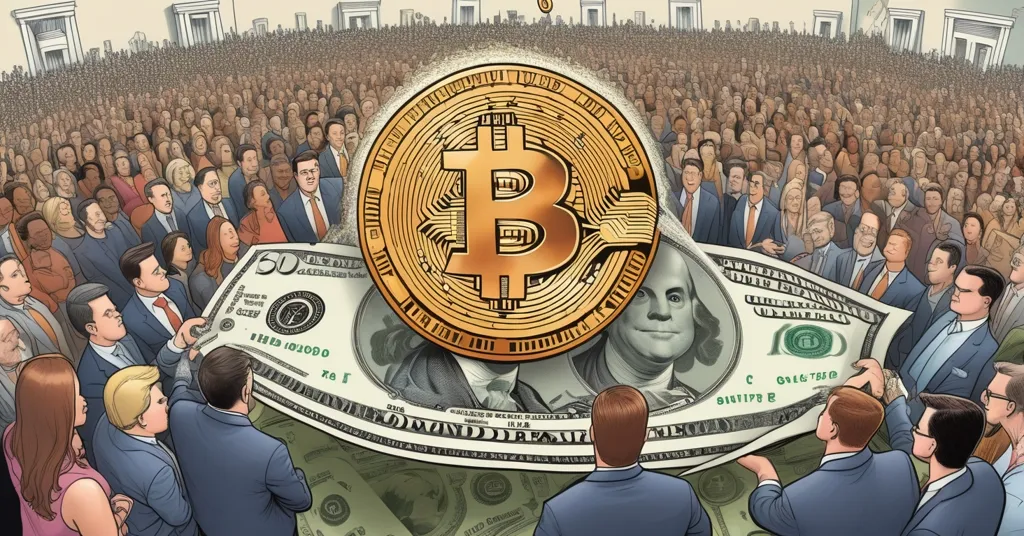BlackRock CEO Warns of U.S. Dollar Decline, Sees Bitcoin as Threat

BlackRock CEO Warns U.S. Debt Could Weaken Dollar’s Global Role to Bitcoin
BlackRock CEO Larry Fink has issued a stark warning about the potential decline of the U.S. dollar due to the country’s rapidly increasing debt. In his annual letter, Fink not only highlights the alarming growth of national debt but also points to Bitcoin and decentralized finance as potential disruptors to America’s economic dominance.
- U.S. dollar’s potential decline due to growing deficits
- Bitcoin as a threat to America’s economic advantage
- Tokenization making investing more democratic
The U.S. Debt Crisis
Since 1989, the U.S. national debt has grown at a rate three times faster than GDP, a trend that Fink warns could lead to a financial crisis. By 2030, he predicts that mandatory government spending and debt service will consume all federal revenue, leaving no room for discretionary spending. This year alone, interest payments on the national debt are expected to surpass $952 billion, eclipsing even defense spending.
“This year, interest payments will surpass $952 billion — exceeding defense spending. By 2030, mandatory government spending and debt service will consume all federal revenue, creating a permanent deficit.” – Larry Fink
The U.S. national debt currently stands at approximately $34.7 trillion, a figure that underscores the urgency of addressing these fiscal issues. Economists like Nouriel Roubini have echoed Fink’s concerns, warning of potential economic instability if current trends continue. However, others like Kenneth Rogoff argue that the U.S. has the capacity to manage its debt due to its economic strength and the dollar’s status as a global reserve currency.
Bitcoin’s Rise as a Disruptor
Fink’s concerns extend beyond the fiscal cliff. He sees decentralized finance (DeFi), which refers to financial services built on blockchain technology bypassing traditional financial intermediaries, and Bitcoin as potential threats to the U.S. dollar’s global dominance. If investors begin to view Bitcoin as a safer bet than the dollar, it could undermine America’s economic advantage. This perspective is particularly noteworthy given BlackRock’s own foray into the cryptocurrency market, with its Bitcoin ETF attracting over $48 billion by March 2024.
“Decentralized finance could undermine America’s economic advantage if investors begin seeing Bitcoin as a safer bet than the dollar.” – Larry Fink
Analysts like Michael Saylor and Cathie Wood have been vocal about Bitcoin’s potential to serve as a hedge against inflation and currency devaluation. They argue that Bitcoin’s decentralized nature and limited supply make it an attractive alternative to traditional currencies. However, it’s important to acknowledge the volatility of Bitcoin and the regulatory challenges it faces, which could hinder its widespread adoption.
The Promise of Tokenization
Yet, Fink isn’t just sounding the alarm; he’s also pointing to a potential silver lining in the form of tokenization. Tokenization is the process of representing assets on a blockchain, allowing for fractional ownership. Fink believes that tokenization can revolutionize investing by making it more democratic. Through tokenization, investors can gain fractional ownership of assets, from stocks and bonds to private real estate and equity, thereby lowering barriers to entry and broadening access to investment opportunities.
“Every stock, every bond, every fund — every asset — can be tokenized,” and “tokenization makes investing much more democratic.” – Larry Fink
Blockchain experts like Vitalik Buterin emphasize the transformative potential of tokenization. Real-world examples include the tokenization of real estate in Switzerland and art through platforms like Maecenas, illustrating the practical applications and benefits of this technology. However, the regulatory landscape surrounding tokenization remains uncertain, which could impact its pace of adoption.
BlackRock’s Role in Cryptocurrency
BlackRock’s engagement with Bitcoin and blockchain technology underscores a broader trend of traditional financial institutions recognizing the potential of these technologies. As the world’s largest asset manager, overseeing $11.5 trillion in assets as of 2024, BlackRock’s actions speak volumes about the shifting landscape of finance. The success of BlackRock’s iShares Bitcoin Trust ETF, with net assets reaching $47.1 billion as of April 3, 2025, indicates its significant role in making cryptocurrencies more mainstream and accessible to investors.
Challenges and Counterpoints
While Fink’s warnings about the U.S. dollar’s future are sobering, his insights into the potential of Bitcoin and tokenization offer a glimpse into a future where finance is more decentralized and accessible. However, the path forward is fraught with challenges, from regulatory hurdles to the environmental impact of Bitcoin mining. The energy consumption associated with Bitcoin mining has raised concerns about its sustainability, a factor that could deter environmentally conscious investors.
Moreover, the volatility of Bitcoin and the lack of regulatory clarity pose significant risks. While Fink’s dire predictions about the U.S. dollar are a wake-up call, not just a scare tactic, it’s crucial to consider these counterpoints to maintain a balanced perspective on the future of finance.
Key Takeaways and Questions
- What is the current state of the U.S. national debt, and how does it compare to GDP growth?
The U.S. national debt has grown three times faster than GDP since 1989, with interest payments expected to surpass $952 billion in 2024, exceeding defense spending.
- How could Bitcoin challenge the U.S. dollar’s global dominance?
Bitcoin could challenge the U.S. dollar’s dominance if investors see it as a safer bet due to the U.S.’s growing deficits and the potential of decentralized finance to undermine America’s economic advantage.
- What is tokenization, and how does it make investing more democratic?
Tokenization is the process of representing assets on a blockchain, allowing for fractional ownership. This makes investing more democratic by lowering barriers to entry and enabling access to previously inaccessible assets like private real estate and private equity.
- What role does BlackRock play in the cryptocurrency market?
BlackRock has launched a Bitcoin ETF that attracted over $48 billion by March 2024, indicating its significant role in making cryptocurrencies more mainstream and accessible to investors.
At Let’s Talk, Bitcoin, we champion the potential of Bitcoin and blockchain technology to disrupt traditional finance and empower individuals. While we acknowledge the challenges, we remain optimistic about the future of decentralized finance.



